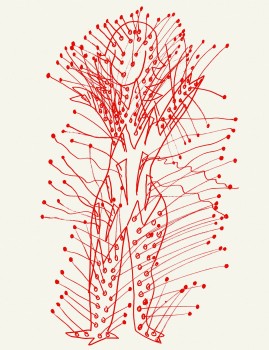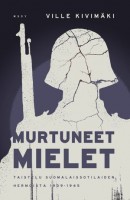Tag: medicine
Mad men
5 December 2013 | Non-fiction, Reviews

lllustration from the cover of Hulluuden historia
Hulluuden historia
[A history of madness]
Helsinki: Gaudeamus, 2013. 456 pp.
ISBN 978-952-495-293-4
€39, hardback
The Hippocratic Oath’s principle, primum non nocere – ‘first, do no harm’ – has been particularly difficult to apply in practice for doctors who have devoted themselves to sicknesses of the soul.
The breaking with this principle is the first thing to strike the reader in Professor of Science and Ideas Petteri Pietikäinen’s book, Hulluuden historia, which is overflowing with ideas.
This could be due to the vast amount of information contained within the book, combined with its slightly chaotic structure. It skips between a chronological and thematic narratives, and the author’s own involvement in his text varies, meaning that the text itself swings between vigorously discursive, and something that is little more than a sluggish retelling. Taking in everything Pietikäinen wants to say is difficult; the reader inevitably begins to grope for exciting details, and there are of course plenty of those to be found.
The sad thing is that the development of mental health care has not advanced steadily at all from its dark and ignorant beginnings towards a brighter and more enlightened present. Setbacks, especially concerning patients’ safety, have been many. Even if we ignore centuries of exorcisms, abuse, and care in the form of incarceration, punishment, and physical punishment, the 20th century has a wealth of gruesome examples to offer. More…
Ville Kivimäki: Murtuneet mielet. Taistelu suomalaissotilaiden hermoista 1939–1945 [Broken minds. The battle for the nerves of the Finnish soldiers 1939–1945]
28 November 2013 | Mini reviews, Reviews
 Murtuneet mielet. Taistelu suomalaissotilaiden hermoista 1939–1945
Murtuneet mielet. Taistelu suomalaissotilaiden hermoista 1939–1945
[Broken minds. The battle for the nerves of the Finnish soldiers 1939–1945]
Helsinki: WSOY, 2013. 475 pp., ill.
ISBN 978-951-0-37466-5
€37, paperback
Ville Kivimäki bases this work on his dissertation. His research concentrates on how mentally wounded soldiers of the Winter War and the Continuation war (1939–1945), were treated and what sort of conclusions can be made as regards to their age and social background. Eighteen thousand men received, or were forced to undergo, psychiatric treatment; no doubt the number of those who remained untreated and those who suffered symptoms after the war was large. Cases increased not just during combat but also during the long periods of trench warfare. Mental problems were considered shameful, and often even the psychiatrists had moralising attitudes. Those who became ill were regarded as physically and mentally weaker material, trying to benefit from their illness. Treatment relied on German methods, mainly appropriate, even though unappropriate examples exist. The goal was to return the patient to the front, to useful work or home. Kivimäki also takes a look at those who did not fall sick and describes the community of the soldiers at the front and their ways of coping. Remains of wartime attitudes were, surprisingly, seen in doctor’s views as late as the 1990s, when remunerations were discussed. The book won the Finlandia Prize for Non-fiction in 2013.
